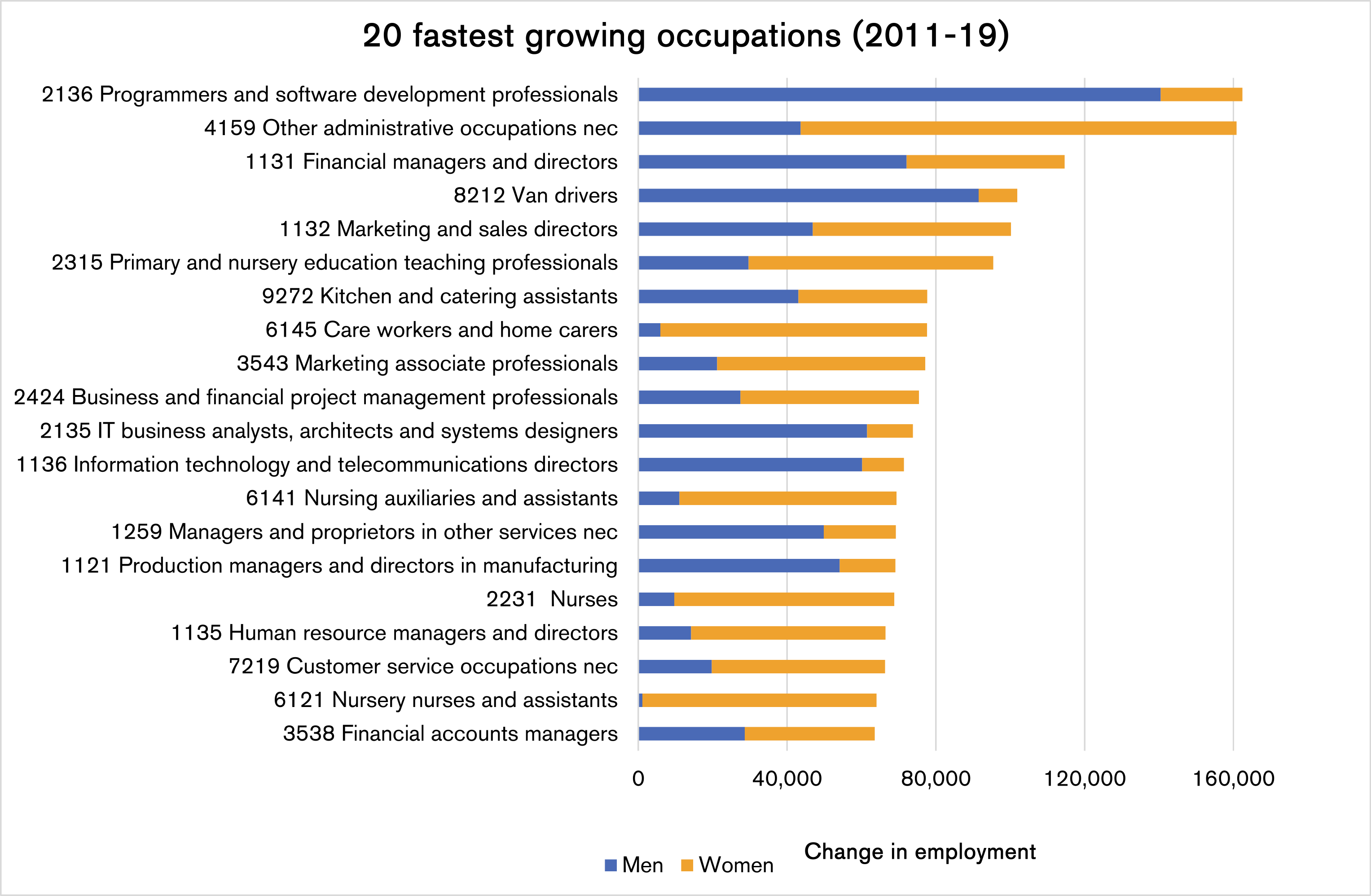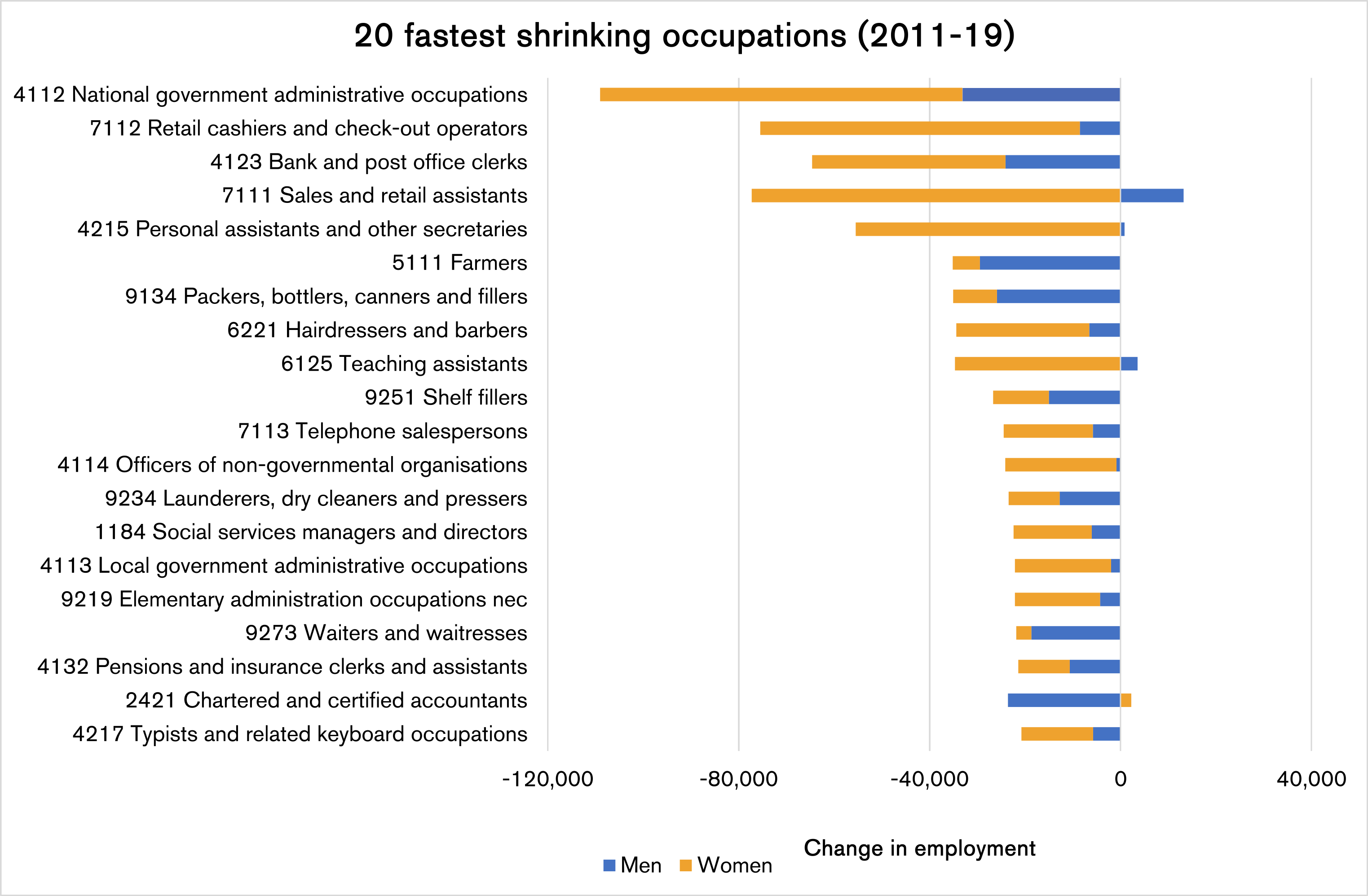As the economy has evolved over the last decade, a perfect storm of austerity, automation and e-commerce has created winners and losers, with women in particular bearing the brunt of job losses in back office and high street roles. But the start of a new decade warrants a healthy dose of optimism. What new jobs will emerge? And how can we support workers to transition into the jobs of the future?
The future of work is coders and carers
We analysed Labour Force Survey data to understand what the fastest growing and shrinking jobs were between 2011-19, in terms of their net change in total employment.
It may come as little surprise that programmers and software developers were the fastest growing occupations, with over 160,000 new roles created (a 72 percent increase from 2011). IT directors and business analysts were also in the top 20 fastest growing occupations. But unfortunately, the cliché of ‘tech bros’ is entirely warranted: less than 20 percent of these flashy well-paid jobs were filled by women.
Expect to see more of these hi-tech roles in the 2020s – as the tech giants look set to disrupt traditional industries such as healthcare and finance.
We have also seen a growth in hi-touch jobs. Primary and nursery school teachers, care workers and home carers, nurses and nursing assistants were also in the top 20 fastest growing occupations. These roles are also gendered, with the vast majority being filled by women. The growth in these roles is in keeping with changing demographics, particularly an ageing, ailing population – a trend which is almost certain to continue into the next decade.
The death of the high street
The top 20 occupations that have seen the biggest losses include many traditional high street jobs, such as retail sales assistants, check out cashiers, bank and post office clerks and dry cleaners. 289,000 high street jobs were lost over the last decade, 81 percent of which were held by women. Previous RSA analysis suggests that the death of the high street is also having a disproportionate impact on regions outside of London. Back office roles, such as administrators in government, personal assistants, telephone salespeople and pensions clerks are also in long-term decline.
Blame austerity. Blame automation. Blame e-commerce.
What jobs could these workers be doing in the 2020s?
Jobs of the future
We expect these trends to continue into the next decade. But to predict the jobs of the future, we may need to do more than simply look at the past. For many are yet to widely exist, let alone be classified in official statistics.
In the RSA’s Four Futures of Work report we used a method known as morphological analysis to map out different scenarios for 2035. This involved drawing on expert opinion to identify high-impact, highly uncertain drivers of change, from technological progress to the health of the global economy and future of the trade union movement. We then explored the different ways these ‘critical uncertainties’ could play out over time and interact with each other.
While these scenarios for the future of work are not exhaustive predictions, they present a wide range of plausible outcomes in a way that is vivid and easy to grasp. Each offers a glimpse of the different kinds of jobs we expect to see in the next decade.
- The Big Tech Economy: technology develops rapidly, leading to widespread automation and tech companies tightening their grip on traditional industries. More coders and agile project managers are needed. New jobs in the tech ecosystem would also emerge; for example, lawyers who deal with claims against driverless cars. There may even be drone delivery drivers and virtual reality experience designers.
- The Precision Economy: technological progress is moderate, but sensors are widely adopted by businesses. Resources are allocated with much greater precision. Workers are subject to new levels of algorithmic management as gig platforms break into new sectors. This expansion of big data calls for more analysts to crunch the numbers, while behavioural scientists and gamification experts design addictive apps to squeeze every last drop of juice out of workers.
- The Exodus Economy: another economic recession causes technological progress to stall. Alternative economic models gather interest as people give up on consumer capitalism in search of more sustainable lifestyles. Job losses are felt in industries underpinned by consumer spending. But occupations such as upcycled clothing designers and community energy managers go mainstream.
- The Empathy Economy: technology is stewarded responsibly. Dirty, dull and dangerous jobs are automated as emotional work becomes more important. Jobs growth is seen in traditional ‘empathy’ industries such as education, care and entertainment. New roles emerge, including personal brand and digital detox consultants to help us manage our relationship with social media, while retail workers pivot to become “in-store influencers” who are highly knowledgeable about brands and able to deliver authentic experiences.
How to help workers transition
Women have borne the brunt of jobs lost to automation and austerity in the last decade, as well as missing out on the best-paid new jobs. At the same time, a recent OECD study has warned that low-skilled workers at risk of automation are three times less likely to participate in training than those in jobs more resilient to technological change. These workers face a double whammy. We need to do more to help them transition into the jobs of the future otherwise they will be ‘left behind’.
There is no silver bullet here, but the UK should take note from best practice from around the world.
Both France and Singapore are piloting personal learning accounts, which give all workers annual training credits that they can spend on accredited courses. Personal learning accounts are a ‘portable benefit’, independent from employment arrangements – meaning the credits accrued are retained by workers even if they move jobs or become unemployed.
In Sweden, employers pay into funds to provide workers with an end-to-end transition service, following collective redundancies. Organisations known as job security councils provide displaced workers with information about their local labour market, as well as coaching, training opportunities and financial compensation. This makes Sweden’s economy more dynamic. Businesses can more easily shed unproductive labour because unions can support job cuts, knowing that workers will be protected.
New jobs will emerge in the 2020s – from coding to caring, and new roles rooted in sustainability. But for workers to transition we will need a robust approach to upskilling and reskilling. Lifelong learning is one key pillar of the new social contract that we must build backing for. In the next few months, the RSA will be publishing a report outlining a blueprint for this social contract: a set of interlocking rights and responsibilities, for state and society, that can drive good work and economic security, now and in the future.



Join the discussion
Comments
Please login to post a comment or reply
Don't have an account? Click here to register.
Thanks for this Fabian. Lots of interesting insights.
Interesting. I wonder whether change will be as rapid as this seems to suggest, given the inertia that affects some sectors - and also how this plays out globally, in say Asia or Africa, given the socio-economic differences. My guess is that while much of this may be true in some places (such as London and the South East in the UK, some parts of Europe or of Asia), for most people in most places change will be less dramatic and come more slowly.
It is 35 years since I wrote "Learning for Change" - about the impact of AI on education and training. It sold out after a truly vitriolic review in the TES which called it "a cheats charter". It is 35 years since I co-authored "No End of Jobs", when the "Death of Work", because of Robotics and AI, was "enjoying" one of its periodic vogues. Coding is important as the modern equivalent of algebra or Latin (as training for the mind), but every so often a new wave of automated tools has overtaken the forecast demand for coders. Those who are no more than coders have been stuck for over forty years in a treadmill of professional updating to keep abreast of change. or watch their earnings dwindle in the face of overseas competition. Those who deploy the evolving technologies to meet human needs (from carers to entertainers) can enjoy lifelong learning to switch from career to career (not just job to job) - always assuming they have not trapped themselves with student debt acquiring degrees that will never repay the cost of acquisition.
Have the authors of this work been living on a different planet? It's all interesting analysis and, as far as it goes, a credible mapping of the future - except that it appears to have no regard for the paradigm shift that's taking place on our watch. Much evidence points to an unfolding climate emergency...
David Attenborough for example has said recently "THE MOMENT OF CRISIS HAS COME". Does the RSA have evidence that he wrong?
https://www.bbc.co.uk/news/science-environment-51123638
This RSA analysis of new jobs reads as if there is no crisis to consider. In fact business evolution as usual would appear to be the thinking of the day..... I would like to suggest that unless there are many new jobs, for example directed at decarbonisation of energy and transport and home heating, together with the changes needed to our attitudes and behaviours, we will have little hope of meeting Net Zero targets or adapting to the fundamental changes of climate now emerging.
It would be great to see the RSA leading the thinking on the societal changes needed to support the move to Net Zero carbon emissions.
Very interesting article. All those programers and software engineers ranking at the top of the fastest growing occupations for the years to come will need to take the human component into consideration. Digital transformations of big corporations will not only be lead by techy profiles, but also by a Change Management team that will help people adapt and adopt the changes.